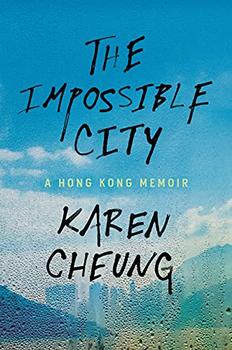Summary | Excerpt | Reviews | Beyond the Book | Readalikes | Genres & Themes | Author Bio

A Hong Kong Memoir
by Karen Cheung
It's June 29, 1997. On TVB, the anchor Keith Yuen announces solemnly: Thirty more hours till Hong Kong is handed back to China. The handover ceremony is taking place at midnight on July 1; Prince Charles and Tony Blair would be in attendance, as would Jiang Zemin and Li Peng. At Tiananmen Square, where less than a decade ago students were killed asking for democracy, Beijingers are waving little handheld flags with the Hong Kong bauhinia flower stamped onto it, celebrating our return. It's raining near the Hong Kong–China border in Sheung Shui, where my friend SP is holding a Chinese five-star flag to welcome the motherland. When she tells me this two decades later, I'm astonished. How do you love a mother you have never known?
My family is watching the evening news broadcast over steamed fish. The Chinese army is getting ready to crawl into the city. A police spokesperson says they will try their best to accommodate peaceful protests, but that Hong Kong would not tolerate "illegal" ones. Chris Patten, the last governor of Hong Kong, is at an English Gothic cathedral in the affluent, Westernized area of Mid-Levels for a final mass. Pro-democracy protesters have pitched their tents near the Wan Chai Pier under the watchful gaze of the police. They camp out there until the handover ceremony at the convention center just a kilometer away. Journalists take their place, mounting their cameras, notebooks ready. Veteran reporter Yuen Chan is at the ceremony, reporting for ATV, a major television station in Hong Kong, and later she writes: "The whole thing seemed strangely devoid of passion. The players just went through the motions. Some soldiers marched, some bands played. . . . Everyone clapped. The territory of Hong Kong and 6.5 million people were handed over from one sovereign power to another. It left me cold."
It is midnight, and the hostile sky is collapsing under the storm. The Chinese state media calls it the "washing away of the century-long humiliation due to colonialism." Prince Charles says, "We shall not forget you, and we shall watch with the closest interest as you embark on this new era of your remarkable history." At the ceremony in the Wan Chai Convention Centre, the British flags are lowered. Chris Patten boards a yacht and sails out of the harbor. We are on our own now. No longer controlled by our colonial masters, and not yet subsumed by our postcolonial lords.
The queen's portrait is taken down. "God Save the Queen" is swapped for "March of the Volunteers." A few government institutions are renamed, and all mentions of "royal" and "crown" are scrubbed. But for months, even years, the only visible changes are ceremonial. It is the beginning of what the British and the Chinese promised us: one country, two systems. English remains an official language, and we can keep speaking our southern Chinese dialect of Cantonese for now. A separate territory under one sovereignty, with the right to preserve our independent judiciary and capitalist systems. In twenty years, the Chinese will tell us that this is not a right, but a privilege that could be taken away if we misbehave. The chief executive is the leader of the city now rather than the British governor, but ordinary residents still do not have the right to vote them into office democratically, although our constitution assures us that we could in the future. For now, they promise that it will be "Hong Kong people administering Hong Kong"—that our way of life will be unchanged for fifty years.
Excerpted from The Impossible City by Karen Cheung. Copyright © 2022 by Karen Cheung. All rights reserved. No part of this excerpt may be reproduced or reprinted without permission in writing from the publisher.
Poetry is like fish: if it's fresh, it's good; if it's stale, it's bad; and if you're not certain, try it on the ...
Click Here to find out who said this, as well as discovering other famous literary quotes!
Your guide toexceptional books
BookBrowse seeks out and recommends the best in contemporary fiction and nonfiction—books that not only engage and entertain but also deepen our understanding of ourselves and the world around us.